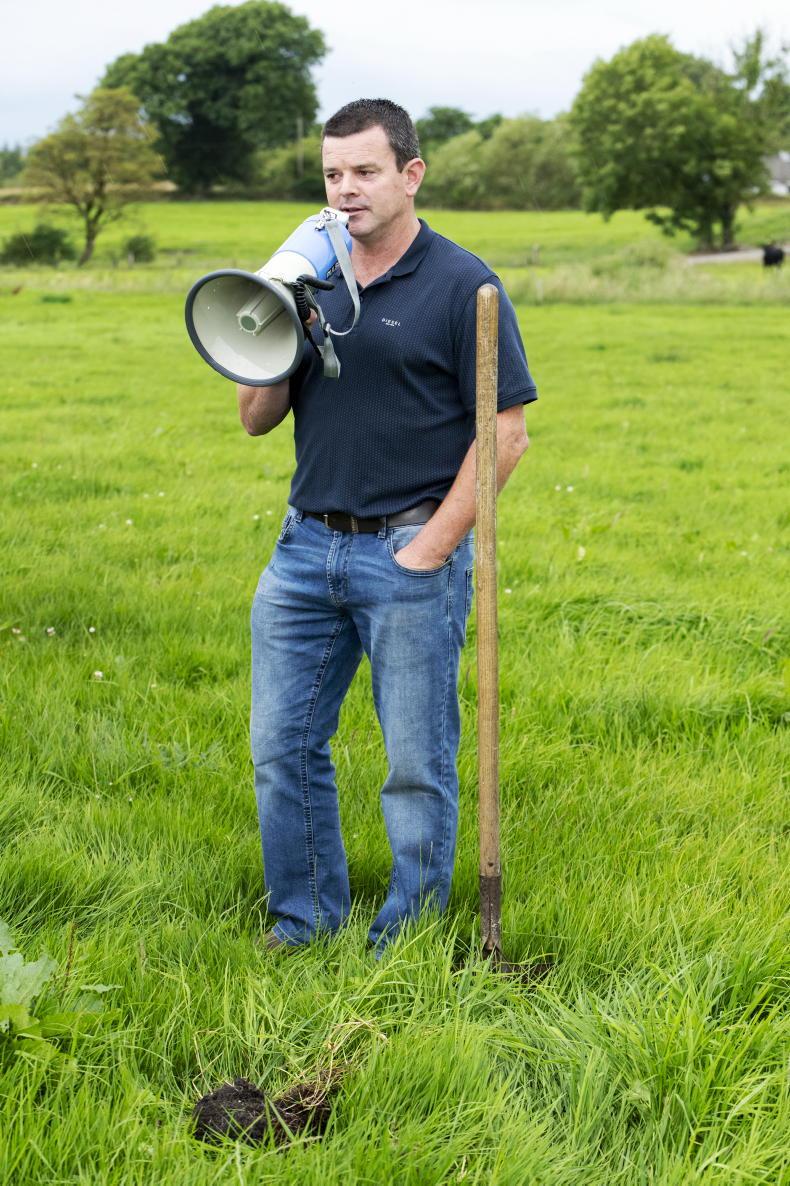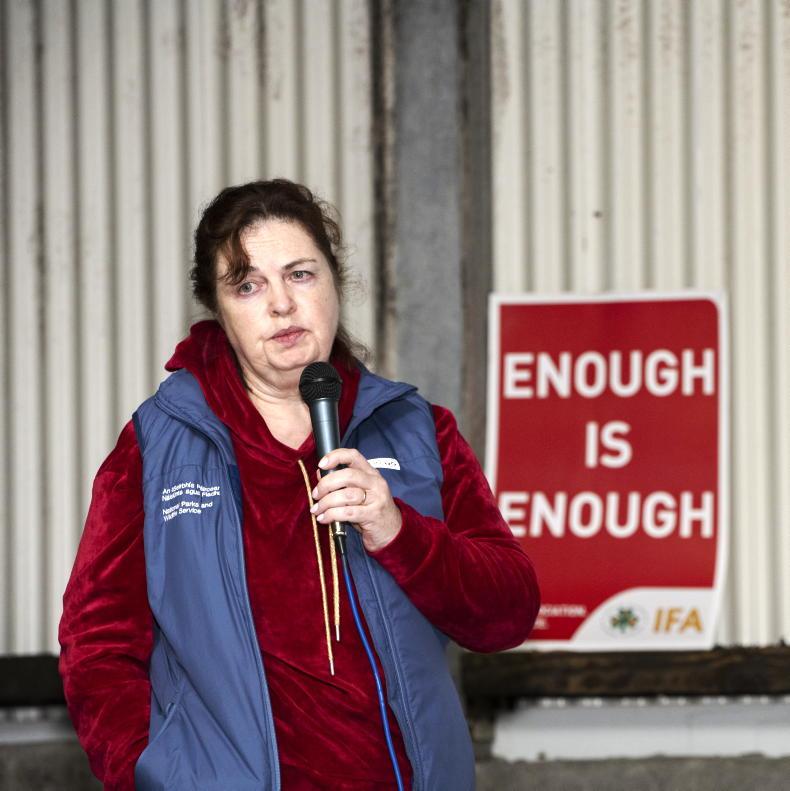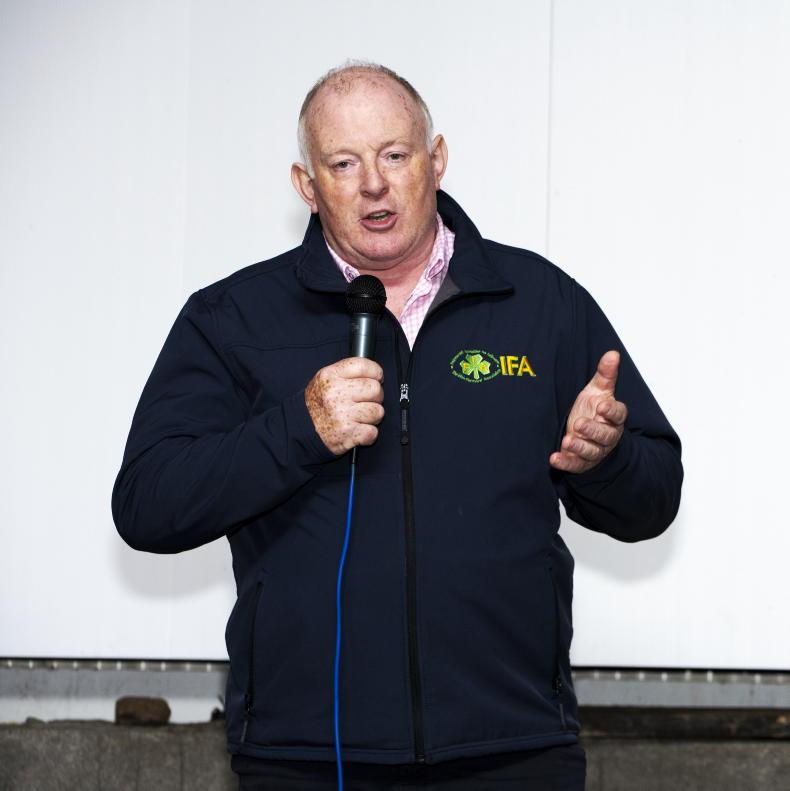The word ‘voluntary’ must be “enshrined in law” in all future legislation enacted by the Dáil to implement the Nature Restoration Law, Roscommon Galway TD Michael Fitzmaurice has claimed.
Funding must also be provided for the law and guaranteed for 20 to 30 years, Fitzmaurice and a number of other contributors told an IFA meeting in Galway.
Under the law, Ireland is committed to putting measures in place to restore 30% of its drained peatlands by 2030, with at least one quarter of this area being rewet.
“The first thing that needs to be done when the consultation [on the law] is happening is that the word ‘voluntary’ be put into the law,” Fitzmaurice told the meeting.
“Because, up to now, everybody has been telling us that it will be voluntary, but they’ve been afraid to put it down on paper,” the Roscommon-Galway TD said.
The independent TD echoed contributions from the floor of the meeting – which was held on the Clonberne farm of Mícheál Haverty and attracted a crowd of close to 200 – that long-term funding needed to be put in place to compensate farmers for income foregone and the additional costs associated with tighter environmental controls.
He pointed to the experience of farmers who had land designated in the 1990s, and who subsequently lost compensation payments, but the farming restrictions remained in place.

Clonberne farmer Mícheál Haverty. \ John Corless
“We have to be agreeing a 20- or 30-year compensation deal, or forget about it,” deputy Fitzmaurice said.
This view was also expressed by a number of farmers on the evening, with one maintaining that there could be “no permanent designation, without permanent compensation”.
Galway TD Seán Canney warned that there was the potential for the Nature Restoration Law to end up in a “sorrowful mess” due to the amount of work that has to be completed over the next two years to implement the regulation in Ireland. The Tuam-based deputy said there was still no maps of the areas impacted, no concrete idea of what the regulation wanted to achieve, and not enough time to carry out the work.
IFA president Francie Gorman told the meeting that any plans introduced in Ireland to implement the law must not impact “farmers’ ability to farm their own land”.

Michael Fitzmaurice TD addressing the IFA meeting at Clonberne, Co Galway, on the Nature Restoration Law. \ John Corless
Nature Restoration Law will be voluntary for farmers – NPWS
The Nature Restoration Law will be “incentivised” and “voluntary” for farmers to take part in, Áinle Ní Bhriain of the National Parks and Wildlife Service (NPWS) told the Clonberne meeting.
It is in the interests of the NPWS to secure farmer goodwill and co-operation as the success of the law is dependent on the participation and buy-in of farmers, she said.
“This plan will only work, if you make it work,” Ní Bhriain told the farmers present.
She insisted that there were flexibilities built into the law, and that the Irish rewetting targets could be reduced if the State’s “public interests” were at risk.
Ní Bhriain also told the meeting that there is “sufficient capacity in State-owned lands” to reach the rewetting targets to 2030 and beyond.

Áinle Ní Bhriain of the NPWS addressing the IFA's meeting on the Nature Restoration Law at Clonberne, Co Galway. \ John Corless
However, she admitted to not knowing what will happen where some farmers with peatlands opt to have their lands rewet but their neighbours do not.
“That’s where protections will have to be considered,” Ní Bhriain said.
The NPWS said farmers’ concerns would be addressed during the consultation process, when the service will take on board the views of stakeholders and the general public.
When asked how farmers could have confidence in the NPWS, Ní Bhriain replied “because this plan has to have your voices in it”.
Battling for the choice to farm
The Clonberne meeting was hosted by Mícheál Haverty, a drystock farmer who primarily runs a suckler operation, although he buys in a few dairy calves each year.
The Haverty holding is the exact type of farm that could be seriously impacted by the Nature Restoration Law. On a quick tour before the discussions started, Haverty showed those attending the grade of land he has.
He said the bulk of the farm comprised black peaty soils, or what he described as “soft digging”.
‘It’s drying I need’
“I don’t need to rewet this land. It’s wet enough, it’s drying I need,” Haverty commented.
The farm was bought by his mother and father in the 1960s, after they returned from England.
Haverty said farming was in his blood and that he wanted “to stay at it”.
He expressed serious reservations about the impact of the law on farmers like him who are working peat soils. “I want to stay farming and I’d like to give the lads [his children] the option to farm. If they don’t want to [farm], then that’s their choice; but I want that choice to be theirs,” Haverty said.

IFA president Francie Gorman addressing the meeting at Clonberne on the Nature Restoration Law.
The word ‘voluntary’ must be “enshrined in law” in all future legislation enacted by the Dáil to implement the Nature Restoration Law, Roscommon Galway TD Michael Fitzmaurice has claimed.
Funding must also be provided for the law and guaranteed for 20 to 30 years, Fitzmaurice and a number of other contributors told an IFA meeting in Galway.
Under the law, Ireland is committed to putting measures in place to restore 30% of its drained peatlands by 2030, with at least one quarter of this area being rewet.
“The first thing that needs to be done when the consultation [on the law] is happening is that the word ‘voluntary’ be put into the law,” Fitzmaurice told the meeting.
“Because, up to now, everybody has been telling us that it will be voluntary, but they’ve been afraid to put it down on paper,” the Roscommon-Galway TD said.
The independent TD echoed contributions from the floor of the meeting – which was held on the Clonberne farm of Mícheál Haverty and attracted a crowd of close to 200 – that long-term funding needed to be put in place to compensate farmers for income foregone and the additional costs associated with tighter environmental controls.
He pointed to the experience of farmers who had land designated in the 1990s, and who subsequently lost compensation payments, but the farming restrictions remained in place.

Clonberne farmer Mícheál Haverty. \ John Corless
“We have to be agreeing a 20- or 30-year compensation deal, or forget about it,” deputy Fitzmaurice said.
This view was also expressed by a number of farmers on the evening, with one maintaining that there could be “no permanent designation, without permanent compensation”.
Galway TD Seán Canney warned that there was the potential for the Nature Restoration Law to end up in a “sorrowful mess” due to the amount of work that has to be completed over the next two years to implement the regulation in Ireland. The Tuam-based deputy said there was still no maps of the areas impacted, no concrete idea of what the regulation wanted to achieve, and not enough time to carry out the work.
IFA president Francie Gorman told the meeting that any plans introduced in Ireland to implement the law must not impact “farmers’ ability to farm their own land”.

Michael Fitzmaurice TD addressing the IFA meeting at Clonberne, Co Galway, on the Nature Restoration Law. \ John Corless
Nature Restoration Law will be voluntary for farmers – NPWS
The Nature Restoration Law will be “incentivised” and “voluntary” for farmers to take part in, Áinle Ní Bhriain of the National Parks and Wildlife Service (NPWS) told the Clonberne meeting.
It is in the interests of the NPWS to secure farmer goodwill and co-operation as the success of the law is dependent on the participation and buy-in of farmers, she said.
“This plan will only work, if you make it work,” Ní Bhriain told the farmers present.
She insisted that there were flexibilities built into the law, and that the Irish rewetting targets could be reduced if the State’s “public interests” were at risk.
Ní Bhriain also told the meeting that there is “sufficient capacity in State-owned lands” to reach the rewetting targets to 2030 and beyond.

Áinle Ní Bhriain of the NPWS addressing the IFA's meeting on the Nature Restoration Law at Clonberne, Co Galway. \ John Corless
However, she admitted to not knowing what will happen where some farmers with peatlands opt to have their lands rewet but their neighbours do not.
“That’s where protections will have to be considered,” Ní Bhriain said.
The NPWS said farmers’ concerns would be addressed during the consultation process, when the service will take on board the views of stakeholders and the general public.
When asked how farmers could have confidence in the NPWS, Ní Bhriain replied “because this plan has to have your voices in it”.
Battling for the choice to farm
The Clonberne meeting was hosted by Mícheál Haverty, a drystock farmer who primarily runs a suckler operation, although he buys in a few dairy calves each year.
The Haverty holding is the exact type of farm that could be seriously impacted by the Nature Restoration Law. On a quick tour before the discussions started, Haverty showed those attending the grade of land he has.
He said the bulk of the farm comprised black peaty soils, or what he described as “soft digging”.
‘It’s drying I need’
“I don’t need to rewet this land. It’s wet enough, it’s drying I need,” Haverty commented.
The farm was bought by his mother and father in the 1960s, after they returned from England.
Haverty said farming was in his blood and that he wanted “to stay at it”.
He expressed serious reservations about the impact of the law on farmers like him who are working peat soils. “I want to stay farming and I’d like to give the lads [his children] the option to farm. If they don’t want to [farm], then that’s their choice; but I want that choice to be theirs,” Haverty said.

IFA president Francie Gorman addressing the meeting at Clonberne on the Nature Restoration Law.










 This is a subscriber-only article
This is a subscriber-only article










SHARING OPTIONS: